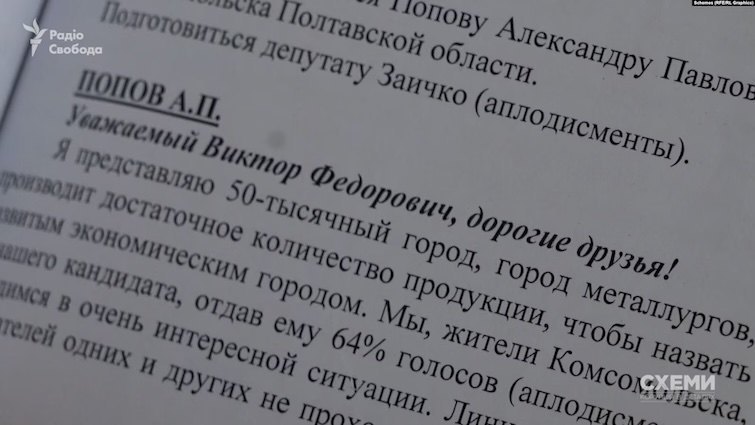Current Ukrainian officials took part in separatist events in 2004, according to an investigation by Skhemy. In particular, the current Kyiv City Council deputy Oleksandr Popov, Kharkiv judge Vladyslav Yehupenko and the head of the Constitutional Court's secretariat.
In 2004, the head of the Central Election Commission, Serhiy Kivalov, declared Viktor Yanukovych the "winner" of the presidential election. Amid reports of fraud, the Orange Revolution began.
Against this backdrop, supporters of Yanukovych and Russia organised their own events. They gathered for a congress in Siverskodonetsk, where they called for the creation of a "South-Eastern Ukrainian Autonomous Republic". On the same days, deputies of the regional councils in Kharkiv and Luhansk voted at additional sessions for executive committees to take over local power from Kyiv. And the Donetsk regional council passed a separate decision to hold a referendum on granting the region "the status of a republic within the federation". All these measures were supported by the Russian authorities.
Skhemy found a closed criminal case regarding the congress in Siverskodonetsk and the separatist decisions of regional councils in the east.
Among the former officials who participated in the separatist events were the ex-head of the Donetsk regional council, Borys Kolesnikov, his Luhansk counterpart, Viktor Tykhonov, the head of the Kharkiv regional state administration, Yevhen Kushnaryov, and others. But there were also those who still hold positions.
Oleksandr Popov is now a Kyiv deputy, and in 2004 he was the mayor of Komsomolsk, Poltava Region. Popov spoke at the congress where they tried to "proclaim" the so-called South-Eastern Ukrainian Autonomous Republic. During the congress, he congratulated Yanukovych on his victory on behalf of the townspeople and promised support.

Vladyslav Yehupenko, then the head of the Kharkiv Southern Railway police, was a member of the executive committee that was supposed to take over all power from Kyiv. Then the so-called executive committee of the Kharkiv Region decided to separate from the authorities in Kyiv and re-subordinated the police in the Region and on the railway, as well as television, and stopped transferring funds to the state budget. Vladyslav Yehupenko is now a judge of the Kharkiv District Administrative Court. When asked whether he had participated in the emergency session at which Kharkiv Region re-subordinated the police, the judge said: "I don't remember, I don't remember that, I don't remember anything at all, to be honest, I'm sorry". He also said that he was against it.
In Donetsk, on the day of the Siverskodonetsk congress, deputies of the regional council, led by Borys Kolesnikov, gathered. The deputies decided to hold a 'referendum' on 'transforming Ukraine into a federation with an independent status for the Donetsk Region'. This is unconstitutional, as the Constitution does not contain a provision for a local referendum.
"Among the archival documents, Skhemy found a list with the names of the deputies of the Donetsk Regional Council who initiated consideration of the referendum. Later - it is not known when exactly - the word "republic" was crossed out of the document and replaced with "subject"," the journalists added.
The criminal case contains a list of people who were appointed to the commission for the 'referendum'. There is a lecturer at Donetsk Technical University, Vladimir Altukhov. He is still a lecturer at this university. When asked how he got on the list, he replied: "I must have literally got there technically, because I hadn't heard about it; I was there because I probably was on Yanukovych's observer list".
Viktor Beschastnyy was one of those who promoted the idea of holding a referendum on the creation of the Donetsk Republic. He was a member of the Donetsk Regional Council at the time and headed the commission on parliamentary activities there. This person signed a letter asking the chairman of the Donetsk Regional Council, Borys Kolesnikov, to consider the referendum. Now he is the head of the Secretariat of the Constitutional Court, which checks all appeals and decides whether to submit them for consideration or not.
"In 2004, it was Beschastnyy who justified to the deputies the need to hold the so-called 'referendum'," the journalists noted.
This is evidenced by an explanatory note in which he wrote that this issue was being submitted to the regional session "taking into account the political situation that threatens public safety, the constitutional order, the life and health of citizens, taking into account the meetings of territorial communities and appeals from deputies of the Donetsk Regional Council." He also approved a draft decision to hold a referendum. He has now told reporters that he had no role in the separatist referendum, did not participate, did not prepare or sign any documents, and "refused to address these issues."
Together with Beschastnyy, the draft decision on the referendum was agreed upon by Oleksandr Zats, deputy chairman of the Donetsk Regional Council. Zats is currently a member of the National Olympic Committee of Ukraine. In 2022, he went abroad under the guise of a volunteer and never returned.
Among those invited on the day of the referendum vote was also Ruslan Cherkaskyy, who was then the head of the Donbas Regional Customs. In 2023, he was fired from his post as deputy head of the State Customs Service.
Criminal cases against those involved in these congresses and regional "subordinates" were dropped. President Yushchenko signed the Universal of National Unity, including with Yanukovych as leader of the Party of Regions, in 2006. A month and a half later, the separatism cases were closed. The materials were not submitted to the court, and Kushnaryov and Tykhonov were removed from the status of defendants. In a commentary to journalists, Yushchenko's ally and former head of his Secretariat, Oleh Rybachuk, agreed that the criminal cases on separatism were most likely dropped because of the signing of the Universal of National Unity.
"Back then, it was about finding understanding, uniting and stitching the country together around a united Ukraine. And this is how an agreement was reached to close these cases," Rybachuk said.







